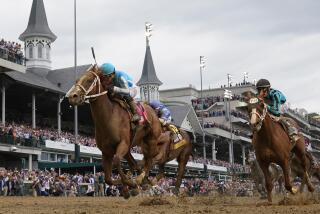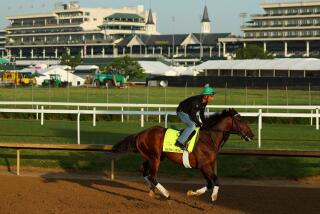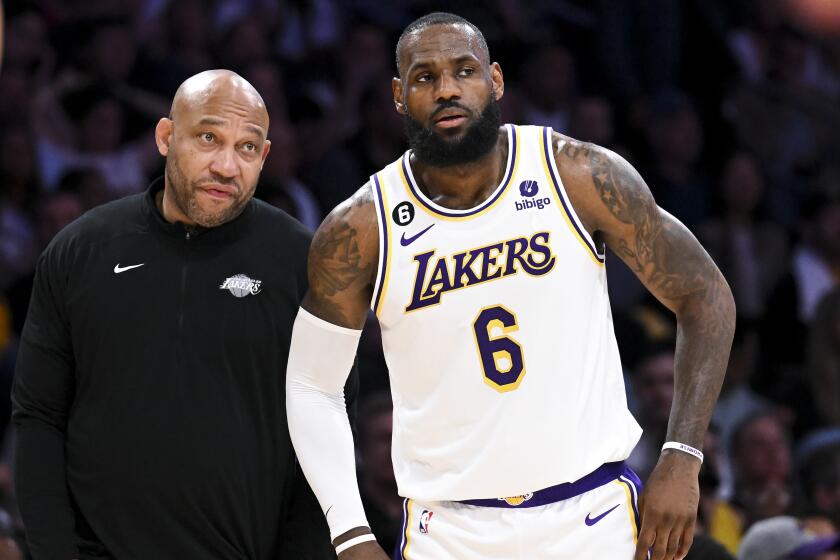Compton Pastor Taps Into Youths’ Passion for Sports
On a recent Sunday, Pastor Robert Smith stood in front of his flock at the Calvary Baptist Church of Compton in a referee’s jersey.
This was the inaugural meeting of Smith’s “Athletes in Worship” seminar series, and the pastor was asking why, in this age of sports-casual fashion, nobody thinks that referee’s stripes are cool enough to wear on the street.
“Maybe,” Smith said to a crowd of sneaker-clad youths and their parents, “that’s because it represents authority.”
Smith then launched into a streetwise disquisition on the nature of authority: the kind that comes from on high, of course, but also the more earthly authority a teenager is more likely to encounter in Compton.
He talked about good and bad referees, and about good and bad police officers.
He even offered some practical advice on avoiding trouble from the bad cops. And he reminded them that officers and referees are imperfect souls upholding the imperfect rules of man.
By contrast, he asked them to consider the Bible.
“For Christians, this is the rule book,” he said, holding his copy aloft. “And you can’t play the game if you don’t know the rules.”
One goal of Smith’s new program, which meets the second Sunday of each month in a modest, 63-year-old church, is to draw on the metaphors of sports to help young people navigate both their spiritual journeys and the real-life streets of south Los Angeles County.
Smith, 53, a former high school basketball player, believes sports can help youths avoid drugs and gangs. But he also sees other potential problems for those who bet too heavily on the idea that sports -- and sports alone -- will make their dreams come true.
“You’ve got a lot of parents who see the dollar signs on these kids and think they’re going to be the next Michael Jordan,” said the pastor of the mainly African American congregation. “They think this is going to be their way out of the ghetto ... but almost one in 100,000 might actually make it. It’s so far-fetched.”
So while Smith takes care of the preaching, he also invites college and pro athletes to talk about the realities of life in the big leagues -- not just the glory, but the breaking of bones, the disappointment of losing, and the realities that set in when a good run comes to an end.
The idea of “sports ministries” is nothing new. But minorities originally played a small part in the white-dominated Fellowship of Christian Athletes, the American sports-ministry giant founded in 1954, said Carey Casey, president of the FCA Foundation, the group’s fundraising arm.
Casey said that began to change in the early 1980s, largely at the urging of former Dallas Cowboys’ coach Tom Landry. Today, FCA works with a number of organizations and churches, including Smith’s, that serve mainly minority populations.
“Coach Landry saw that we can’t sit out here in the suburbs,” Casey said. “You need to help with the greater culture.”
In Compton, the Athletes in Worship program meets in the cozy confines of Smith’s church, where folksy paintings of Martin Luther King Jr. and a black Moses dominate the walls.
Church attendant William Davis, 48, recently watched one son turn a passion for basketball into a marketing degree from Clemson University in South Carolina. A second son just kicked off his hoop dreams at a North Carolina community college.
Joey Davis, 42 -- no relation to William -- brought his 10-year-old son Joey Malcolm Davis to the first meeting of Athletes in Worship. The youngster is already a formidable competitive wrestler, with a strict diet and a two-hour daily workout. Dad said Joey dreams of playing pro sports one day.
“I threw him in the lion’s den,” Davis said proudly. “And God gave me a wrestler.”
Smith said he was inspired in part by his work for the last five years as a chaplain for the Compton Dominguez High boys’ basketball team. But he said he was also sick of seeing promising young athletes on the street and aimless after a successful high school sports career.
“If you don’t make it, what do you fall back on?” Smith asked. “Something’s got to be there to give you a balance.”
So far, the program has played host to former Lakers’ superstar A.C. Green, but also to more obscure athletes such as Essex Johnson, who played running back for the Cincinnati Bengals in the late ‘60s and early ‘70s.
At the first meeting in January, Johnson, a kindly, bald bulldog of a man, told a few tales from his National Football League days. But he also talked about how his spirituality helped him in his current job as a successful real estate broker.
“Be all that you can be, and the Lord’s going to bless your efforts,” he said. “Put him first in your life.”
Members of USC’s football program also dropped by, creating a buzz among the youngsters who had just followed the school’s co-championship season.
Jamaal Williams, 21, joined the USC squad in 2000 after a standout high school career in San Diego. Before he found religion, he said he played football for “self-gratification.”
“That was my only goal,” he said. “Not to help people or anything, but to get to the NFL.”
Once at USC, however, Williams broke his leg numerous times. Eventually, a doctor told him he could never play again.
“God doesn’t love me,” he thought. “I’m going to college for nothing.”
Eventually, Williams said he found both religion and a new plan. He began volunteering at a children’s center on skid row in downtown Los Angeles. He worked for the city’s Housing Authority and in the office of U.S. Rep. Maxine Waters (D-Los Angeles). Now, as a senior, Williams said he plans to attend graduate school to study public policy.
“God has brought me full circle,” he said.
After the meeting, the congregation moved to the rec room for a spaghetti dinner and, for the youngsters, sports video games.
Stefan Williams, a lanky 16-year-old who plays wide receiver for Dominguez, said he has seen many students move on from his school to the big leagues. He said he plans to attend the college that will give him the best scholarship.
Stefan said it’s not easy balancing a sport such as football -- with its aggressiveness and intimidation -- with the humble teachings of Jesus.
“That’s one of the things I’m working on,” he said.
Then his attention turned toward his game pad, and the TV’s frantically flashing lights.
More to Read
Get our high school sports newsletter
Prep Rally is devoted to the SoCal high school sports experience, bringing you scores, stories and a behind-the-scenes look at what makes prep sports so popular.
You may occasionally receive promotional content from the Los Angeles Times.






